Engender blog
Guest blog: Women for Independence (Indyref Thursday #8)
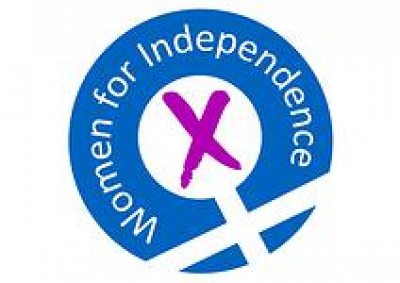 This week's final indyref Thursday is a double page special from two former politicians who have been out on the campaign trail. They describe what they believe their vote will mean for women.
This week's final indyref Thursday is a double page special from two former politicians who have been out on the campaign trail. They describe what they believe their vote will mean for women.
Carolyn Leckie is a former Scottish Socialist Party MSP for Central Scotland.
When I was in the Parliament I got into trouble. For weeks I’d been trying to ask Jack McConnell about the nursery nurses. Nursery nurses who, as women, were deeply skilled but disgracefully paid and striking for better. I’d managed to secure a member’s debate but despite repeated attempts, I was not allowed to ask Jack if he supported them. So, I made a point of order and was overruled. So I stayed standing for the nursery nurses who were thronging the Royal Mile in their hundreds outside. I was chucked out. But I was glad to join the women outside, who were protesting at a parliament that had no control of employment law, equalities, wages or trade union legislation.
Thereafter, me and my colleagues signed in our nursery nurse constituents into the parliament’s canteen. MSPs unused to eating with those who protested against them were most discomfited – as it should be.
Despite its lack of oomph, the very existence of a parliament in Edinburgh shifted the political focus from Westminster. In some ways devolution has let it off the hook. The nursery nurses didn’t board a train to Westminster to breathe down the necks of the politicians with the real power over pay. Just imagine if the Scottish parliament had all the powers: no excuses from McConnell or anyone else that the issues were ‘reserved’; and an electorate not content to stay at home shouting at the telly.
The parliament gave people a sense that there was a point in getting involved in politics. It’s already well placed to be more representative, pluralistic and accessible than Westminster. It has a more proportional system and more women than Westminster. And it can be even better. With women at the centre. We need to make an assessment: how long would it take to get the democracy and equality women aspire to with Westminster? Compared to Holyrood? What do you think the relative chances are? What chance have women of participating in writing a constitution that embeds equality in a UK set up?
Women for Independence was formed more than two years ago. It’s an autonomous network, with over 40 autonomous local groups and autonomous women within it. We have two goals: independence for Scotland and independence for women. The process itself has been empowering. Women who’ve been turned off by male, pale and stale politics suddenly see the point. Why? This in itself illustrates the inherent power of independence. And the inherent disempowerment of Westminster. Women have stirred from this imposed malaise. Another question, are they more likely to stay stirred with a Yes vote or a No vote? I think the former. This is reinforced by the reaction to recent polls from the boys in the bubble. Gordon, Douglas, Danny, Jim and Alistair have emerged from a back room with David, Blair, Alistair and Nick to pronounce a ‘timetable’ for ‘more powers’. They’ve spent the last year claiming the sky will fall in with independence and refused to listen to people on the ground. But, with 10 days to go, a ‘new deal’ emerges. Allegedly.
It seems based (although we don’t really know) on the No parties’ lowest common denominator: Labour’s proposals for devolution. It doesn’t include the power not to go to war. It doesn’t include the power to get rid of nuclear weapons. It doesn’t include big economic powers, employment law, equalities , wages or trade union laws – in other words nursery nurses in any new devolved settlement would still be left shouting at a parliament that does not have the power to do anything. I don’t think women will be fooled. The whiff of self preservation is thick in the air. After people have cast their postal votes, they now think women should trust their wee clique’s pig in a poke. In my mother’s words, “Do they think oor heids button up the back?” We’ve still to send our money down to London. And they’ll send us some back. A burst pay packet is still a burst pay packet.
This latest ‘offer’ reminds me of another time. When I was a UNISON Branch Secretary representing hundreds of low paid Sodexho workers who were on strike. The domestics and porters came to understand their strength when the hospital couldn’t function without them. In desperation, the company and the Trust who’d privatised them at the time started making offers. A full time official by the name of Jim Devine (recently jailed for fiddling his expenses as an MP) implored us to take the latest offer, “You’ve won a watch!” says he. A watch Del Boy would be proud of. We said, “You can keep your watch, we know when we’re winning”.
And we did win. Everything that people had been struggling for. In the referendum, we are at such a time. Real autonomy. Real sovereignty is within our grasp. We can recognise a fake when we see it.
And they’ve a cheek, eh? Thinking we’re that daft. They still don’t get it, do they? This referendum has unleashed a dormant yearning for self realisation. It’s unleashed a knowing of power and politics unprecedented on these shores. It’s unleashed the women. We are not looking for the suited and booted men to retire to the smoking room and come out and tell us what’s happening. We want real power and real democracy. We’ll be telling the elites of Westminster what’s happening.
And it’s not just for ourselves. Solidarity is an issue that the progressive wing of the No campaign mention a lot. I’ve had messages of solidarity from women in England and across the world in this referendum. To vote Yes. Solidarity is not with states. It’s with people. It’s Westminster that’s selling off England’s NHS. A Yes vote, undermining the UK state’s grip, is solidarity with the Jarrow marchers. A Yes vote is on the side of all those struggling against corporate and political elites. A Yes vote assists the winds of change in England. A Yes vote means England will need to talk about disarmament. It’s time women and working class people in England, Wales and Northern Ireland had real power too. Propping up the institutions that are crippling them is not solidarity. Women need to act where they can act. Take their power where they can. Remove ceilings when they start cracking. Voting no is shoring up the joists of Westminster. That’s not in the interests of women anywhere. Vote Yes. Seize the day.
--
Carolyn Leckie is a co founder of WFI. Not a party member. Recent law graduate. Ex MSP. Previous UNISON branch secretary representing health workers. Ex Midwife.
Share this post on …
Comments: 0 (Add)
Downloads
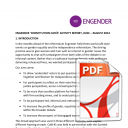 'Constitution Cafes' Activity Report
An activity report on three 'constitution cafe' discussion events on gender equality and the independence referendum, held between June and August 2014.
'Constitution Cafes' Activity Report
An activity report on three 'constitution cafe' discussion events on gender equality and the independence referendum, held between June and August 2014.
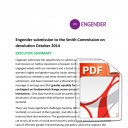 Engender Submission to the Smith Commission
Engender's submission to the Smith Commission on additional powers for the Scottish Parliament.
Engender Submission to the Smith Commission
Engender's submission to the Smith Commission on additional powers for the Scottish Parliament.
 Scotland's Futures: Women and Care
This briefing is part of a series that sets out how power and responsibility to tackle critical gender equality issues are divided between Holyrood and Westminster.
Scotland's Futures: Women and Care
This briefing is part of a series that sets out how power and responsibility to tackle critical gender equality issues are divided between Holyrood and Westminster.
 Scotland's Futures: Women and Poverty
This briefing is part of a series that sets out how power and responsibility to tackle critical gender equality issues are divided between Holyrood and Westminster.
Scotland's Futures: Women and Poverty
This briefing is part of a series that sets out how power and responsibility to tackle critical gender equality issues are divided between Holyrood and Westminster.
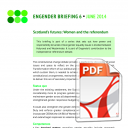 Scotland's Futures: Women and the Referendum
This briefing is part of a series that sets out how power and responsibility to tackle critical gender equality issues are divided between Holyrood and Westminster.
Scotland's Futures: Women and the Referendum
This briefing is part of a series that sets out how power and responsibility to tackle critical gender equality issues are divided between Holyrood and Westminster.
 Scotland's Futures: Women, Politics and Power
This briefing is part of a series that sets out how power and responsibility to tackle critical gender equality issues are divided between Holyrood and Westminster.
Scotland's Futures: Women, Politics and Power
This briefing is part of a series that sets out how power and responsibility to tackle critical gender equality issues are divided between Holyrood and Westminster.
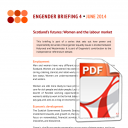 Scotland’s Futures: Women and the Labour Market
This briefing is part of a series that sets out how power and responsibility to tackle critical gender equality issues are divided between Holyrood and Westminster.
Scotland’s Futures: Women and the Labour Market
This briefing is part of a series that sets out how power and responsibility to tackle critical gender equality issues are divided between Holyrood and Westminster.

Newsletter
Sign up to receive our newsletter here:
Sign up to our mailing list
Receive key feminist updates direct to your inbox: